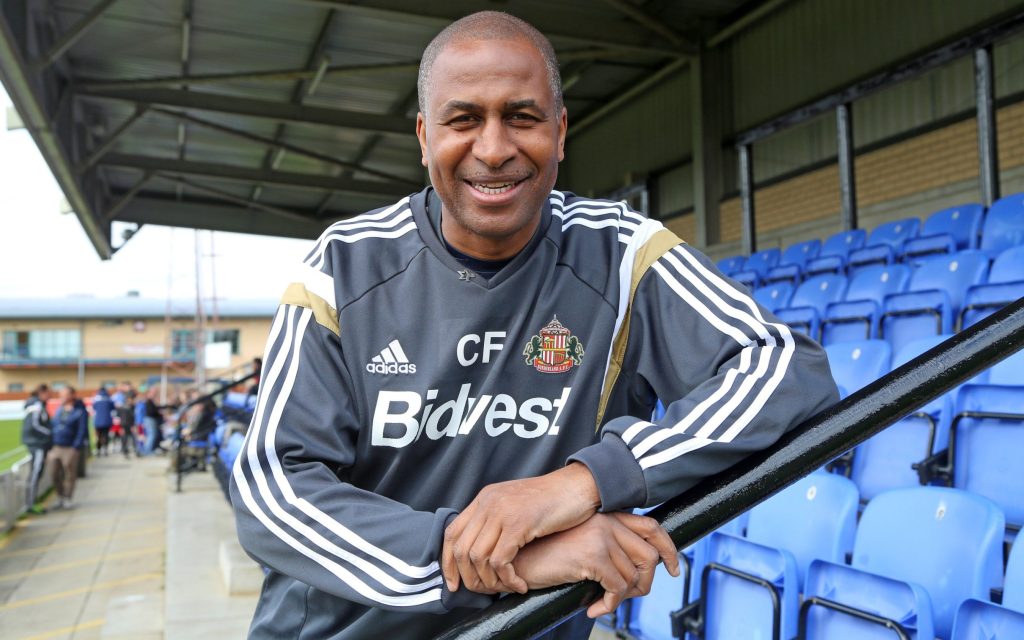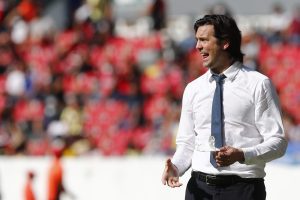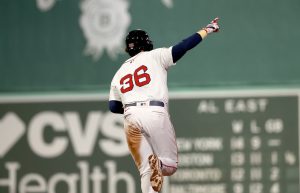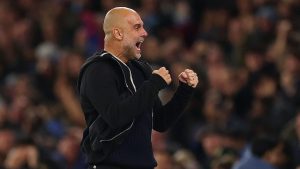
Carlton Fairweather, who has died aged 63, was an English footballer and manager who emerged from the non-League game to excel at the highest level of domestic football with Wimbledon’s “Crazy Gang”, before establishing a second career in coaching and community work with Sunderland.
Fairweather became an honorary Wearsider, staying with Sunderland for 22 years, including three seasons in charge of the club’s women’s team. He was the first black manager in the Women’s Super League.
Carlton Upton Fairweather was born in Camberwell, south London, on September 22 1961. His middle name reflected his father’s fondness for West Ham United, then based at Upton Park.
He served a lengthy apprenticeship in the amateur ranks, playing in the Isthmian League for Dulwich Hamlet, Bromley and (from 1979) Tooting & Mitcham United while he worked as a draughtsman. He then signed for Wimbledon in 1984, their manager Dave Bassett paying Tooting £3,000 for his services.

The combination of burning ambition and humble pedigree made him a perfect fit for the Plough Lane club, who were in the Football League’s second tier barely six years after escaping the Southern League.
A left-winger, tall for the position at 5ft 11in, Fairweather was initially loaned to two clubs in Finland. On returning he scored Wimbledon’s winning goal on his debut, aged 23, at Oldham Athletic on New Year’s Day 1985. In his first home appearance he opened the scoring in a 5-0 rout of Sheffield United.
Fairweather made more than 100 appearances and contributed vital goals over the next five seasons as Wimbledon, vilified for their long-ball game, completed a nine-year rise from part-time football to gatecrashing the elite in 1986. He promptly proved that he belonged in their company with a total – respectable for a wide midfielder – of eight goals in 23 games.
In January 1988 he scored in Wimbledon’s 4-1 victory over West Bromwich Albion in the FA Cup. A week later, however, he suffered a broken leg at Watford. Having helped to propel Bobby Gould’s side on the road to an unlikely Wembley appearance, he had to sit out their even more improbable 1-0 win in the final against Liverpool, the overwhelming favourites.

Fairweather described the day as “terrible”, because he was a mere spectator, “but wonderful” for his club. For the subsequent Charity Shield tussle at Wembley, where Liverpool exacted a modicum of revenge, he was back among the tight-knit band of pranksters whose antics earned the Crazy Gang nickname.
Gould was succeeded by Ray Harford, Peter Withe and Joe Kinnear respectively. In Fairweather’s final two seasons he did not figure in their plans, even leaving the new Premier League for a loan spell at Slough Town in pursuit of regular football. In 1993, after 164 matches and 28 goals for Wimbledon, he was released.
A brief sojourn with Carlisle United followed before he became player-coach at Golden FC in Hong Kong. He was in the China Jump Club when Paul Gascoigne – joined by several England players preparing for Euro 96 – infamously sampled the so-called dentist’s chair, whose occupants attempted to drink a yard of ale. With Fairweather, then 35, in the line-up, Golden lost 1-0 to England in a warm-up match.
He played in the United States for New York Fever, Greek Americans and Connecticut Wolves, also coaching in California. Returning to London, he served as youth coach at Wimbledon and reserve-team manager with Crystal Palace.
Fairweather met his future wife in a Middlesbrough night club and decided to move to the north-east. He applied for a job working in schools for Sunderland’s community scheme, graduating to the position of manager of the women’s team, finishing fourth in his first season. Among the players he nurtured was Beth Mead, who would win Euro 2022 with England and the Golden Boot as the tournament’s top scorer.
After Fairweather was diagnosed with pancreatic cancer, Sunderland’s men’s team – captained by a player he coached in their academy, Dan Neil – gave him a guard of honour before the fixture with Preston North End in March.
Carlton Fairweather is survived by his wife Lesley and their three children.
Carlton Fairweather, born September 22 1961, died April 14 2025

Carlton Fairweather, who has died aged 63, was an English footballer and manager who emerged from the non-League game to excel at the highest level of domestic football with Wimbledon’s “Crazy Gang”, before establishing a second career in coaching and community work with Sunderland.
Fairweather became an honorary Wearsider, staying with Sunderland for 22 years, including three seasons in charge of the club’s women’s team. He was the first black manager in the Women’s Super League.
Carlton Upton Fairweather was born in Camberwell, south London, on September 22 1961. His middle name reflected his father’s fondness for West Ham United, then based at Upton Park.
He served a lengthy apprenticeship in the amateur ranks, playing in the Isthmian League for Dulwich Hamlet, Bromley and (from 1979) Tooting & Mitcham United while he worked as a draughtsman. He then signed for Wimbledon in 1984, their manager Dave Bassett paying Tooting £3,000 for his services.

The combination of burning ambition and humble pedigree made him a perfect fit for the Plough Lane club, who were in the Football League’s second tier barely six years after escaping the Southern League.
A left-winger, tall for the position at 5ft 11in, Fairweather was initially loaned to two clubs in Finland. On returning he scored Wimbledon’s winning goal on his debut, aged 23, at Oldham Athletic on New Year’s Day 1985. In his first home appearance he opened the scoring in a 5-0 rout of Sheffield United.
Fairweather made more than 100 appearances and contributed vital goals over the next five seasons as Wimbledon, vilified for their long-ball game, completed a nine-year rise from part-time football to gatecrashing the elite in 1986. He promptly proved that he belonged in their company with a total – respectable for a wide midfielder – of eight goals in 23 games.
In January 1988 he scored in Wimbledon’s 4-1 victory over West Bromwich Albion in the FA Cup. A week later, however, he suffered a broken leg at Watford. Having helped to propel Bobby Gould’s side on the road to an unlikely Wembley appearance, he had to sit out their even more improbable 1-0 win in the final against Liverpool, the overwhelming favourites.

Fairweather described the day as “terrible”, because he was a mere spectator, “but wonderful” for his club. For the subsequent Charity Shield tussle at Wembley, where Liverpool exacted a modicum of revenge, he was back among the tight-knit band of pranksters whose antics earned the Crazy Gang nickname.
Gould was succeeded by Ray Harford, Peter Withe and Joe Kinnear respectively. In Fairweather’s final two seasons he did not figure in their plans, even leaving the new Premier League for a loan spell at Slough Town in pursuit of regular football. In 1993, after 164 matches and 28 goals for Wimbledon, he was released.
A brief sojourn with Carlisle United followed before he became player-coach at Golden FC in Hong Kong. He was in the China Jump Club when Paul Gascoigne – joined by several England players preparing for Euro 96 – infamously sampled the so-called dentist’s chair, whose occupants attempted to drink a yard of ale. With Fairweather, then 35, in the line-up, Golden lost 1-0 to England in a warm-up match.
He played in the United States for New York Fever, Greek Americans and Connecticut Wolves, also coaching in California. Returning to London, he served as youth coach at Wimbledon and reserve-team manager with Crystal Palace.
Fairweather met his future wife in a Middlesbrough night club and decided to move to the north-east. He applied for a job working in schools for Sunderland’s community scheme, graduating to the position of manager of the women’s team, finishing fourth in his first season. Among the players he nurtured was Beth Mead, who would win Euro 2022 with England and the Golden Boot as the tournament’s top scorer.
After Fairweather was diagnosed with pancreatic cancer, Sunderland’s men’s team – captained by a player he coached in their academy, Dan Neil – gave him a guard of honour before the fixture with Preston North End in March.
Carlton Fairweather is survived by his wife Lesley and their three children.
Carlton Fairweather, born September 22 1961, died April 14 2025












